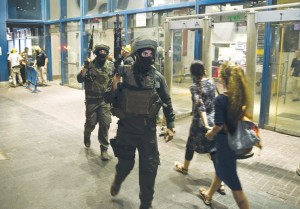
|
Administrative Detention State Control Committee | 15/12/2015 | Discussion
ACRI’s position: Administrative detention is commonly used against Palestinians in the Occupied Territories, and has become more frequently used since the summer of 2014. Following the events of recent months, administrative detention orders have been made against Jewish residents of the territories, and authorities have ordered an exceptional number of administrative restraining orders against Jews living in the West Bank, including minors, and against Palestinian residents of East Jerusalem. Recently there was an unusual use of administrative detention against an Arab citizen of Nazareth and against Palestinians in Jerusalem, who have permanent resident status; including three minors. It is apparently the first time that minors who have legal status in Israel have been administratively detained. These administrative orders are made according to privileged material. The level of danger posed by the person is estimated, as a rule, based on their previous actions or intentions attributed to them, without asking the state to prove those same actions or intent beyond a reasonable doubt, in accordance with a fair criminal trial. Administrative orders and detentions are therefore unacceptable alternatives to ordinary criminal proceedings. These orders make it possible to restrict a person’s freedom for months or years without due process and without allowing them the basic right to defend themselves against the charge made against them. |
|
The Stop and Frisk Bill Constitution, Law and Justice Committee | 16/12/2015 | Preparation for second and third readings
According to the bill, police will be able to search a person’s body in and nearby places of entertainment, without concrete suspicion against the people whose bodies or belongings will be searched. ACRI’s position: The bill opens the door to arbitrary body searches and degrading treatment and discrimination based on people’s origin, nationality etc. The Ministry of Public Security has been trying to promote this proposal for years under various pretexts in order to legitimize police practices that have been banned by the courts. In practice these searches are primarily conducted against people with dark skin and those of Middle Eastern appearance. Police already have extensive search powers and conducting a search is justified if the police officer has suspicion. The bill authorizes police to stop a person on the street and perform an invasive body search without having any suspicion or other justification. Experience in Israel and from around the world indicates that police operate according to their “gut feeling”. In the absence of clear criteria police have to rely on stereotypes and prejudice, which in turn results in excessive policing and selective enforcement against minorities: In the US – African-Americans and Latinos, and in Israel – Jews from middle eastern origins, Ethiopian Jews, African asylum seekers and Arabs. Notably, a similar authority given to police in Britain was rejected by the European Court of Human Rights as an infringement on the rights to privacy and human dignity. To read more about ACRI’s work on the Stop and Frisk Bill click here. |
|
Protection of marginalized and vulnerable populations in plans for urban renewal Special Committee to Discuss the National Authority for Urban Renewal Bill ACRI’s position: Various populations live in areas with plans for urban renewal, all of whom are at a disadvantage with respect to project developers and investors. There are families that are renting apartments and are not eligible for public housing or rent assistance. Regeneration leads to the destruction of affordable housing options for this population, and an increase in rental prices across the area. There are also complexes for the elderly and people with disabilities that need to be evacuated during redevelopment, which can be unbearable for the people living there. We believe that the legislative framework must provide protection for different population groups. This is true in accordance with the right to housing, and also relates to the importance of social integration and a variety of housing. |
|
International Human Rights Day Conference in the Knesset
15 December 2015
This year the focus will be on “Human rights in times of emergency”, led by members of Knesset Benny Begin, Dov Khenin and Karin Elharar. Knesset members from all parties will attend. If you would like to join us please send your full name, phone number and teudat zehut or passport number to Debbie@acri.org.il
|
| In the Spotlight
ACRI report: Government response to wave of violence shows ‘worrisome trend’ on human rights
 POLICE FORCES walk outside the capital’s central bus station after a Palestinian stabbed a woman nearby. (photo credit:REUTERS) By Yonah Jeremy Bob
10 December 2015 – Jerusalem Post
“The government’s response to the current wave of violence has shown a “worrisome trend” of attacks on human rights, the Association of Civil Rights in Israel’s 2015 says in annual report being released on Thursday for International Human Rights Day.
The report accuses the government of careening down a “slippery slope” of unprecedented infractions against human rights.
A substantial part of the problem is the “widespread adoption in Israel and east Jerusalem of means and methods which had been in use in the West Bank, which cause greater harm to a wider cross-section of the population,” the report says.
According to ACRI, “the trend of harming rights to personal body security, to a fair trial, freedom of speech” started during the 2014 Gaza war and has “gotten worse since the wave of violence which started in September.”
|







